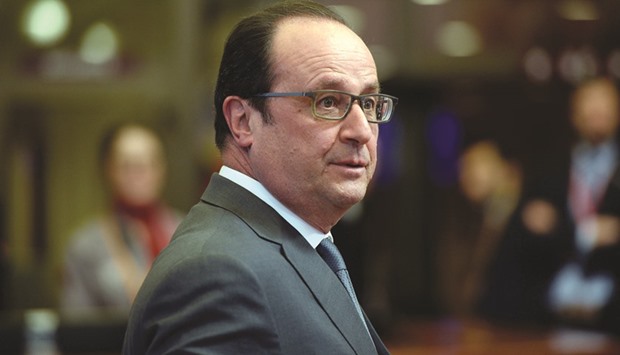French President Francois Hollande said yesterday that there was a risk of war between Turkey and Russia over Syria, adding that Moscow should stop backing Syrian President Bashar al-Assad.
Russia’s foreign ministry said earlier yesterday that it intends to call a session of the UN Security Council to discuss the Turkish government’s statements about a possible ground operation in Syria.
“There is a risk of war between Turkey and Russia,” Hollande told France Inter radio. “There is an escalation.”
“Negotiations must resume, bombardments must stop, aid must come,” he said.
Russian warplanes entered Syria’s increasingly complex five-year-old conflict at the end of September, backing the forces of their ally Assad, and bombing rebel positions.
The Turkish military shot down a Russian jet in November it said had breached its airspace while on a bombing campaign in neighbouring Syria.
“There must be pressure on Moscow so that we have negotiations,” Hollande said. “Moscow will not succeed by unilaterally backing Bashar al-Assad.”
Hollande said in the radio interview that he had told Russian authorities: “You are not striking the right spots and you are striking civilian populations, which is unacceptable.”
Meanwhile, Turkish President Tayyip Erdogan has said US-supplied weapons have been used against civilians by a Syrian Kurdish militia group that Ankara blames for a deadly suicide bombing on Wednesday.
In Washington, the State Department said the US had “not provided any weapons of any kind” to the YPG militia, and the White House said President Barack Obama phoned Erogan to offer US condolences over the bombing in the Turkish capital.
Turkey sees the militia as a terrorist organisation linked to Kurdish militants waging an insurgency on its own soil.
Turkey has blamed the YPG for the suicide car bomb attack three days ago that killed 28 people, most of them soldiers.
Before the call with Obama, Erdogan said he was saddened by the West’s refusal to call the Syrian Kurdish militia terrorists, and would explain to the US president how weapons provided by the US had aided them.
Turkish presidential sources said the call lasted an hour and 20 minutes.
“I will tell him, ‘Look at how and where those weapons you provided were fired’,” Erdogan told reporters in Istanbul.
“Months ago in my meeting with him I told him the US was supplying weapons. Three plane loads arrived, half of them ended up in the hands of Daesh (Islamic State), and half of them in the hands of the PYD,” he said.
“Against whom were these weapons used? They were used against civilians there and caused their deaths.”
He appeared to be referring to a US air drop of 28 bundles of military supplies in late 2014 meant for Iraqi Kurdish fighters near the Syrian city of Kobani. Pentagon officials said at the time one had fallen into the hands of Islamic State. The Pentagon later said it had targeted the missing bundle in an air strike and destroyed it.
The US has said it does not consider the YPG a terrorist group. A spokesman for the State Department said on Thursday that Washington was not in a position to confirm or deny Turkey’s charge that the YPG was behind the Ankara bombing.
The YPG’s political arm has denied the group was behind the Ankara attack.
The Turkish government has said the Ankara attack, in which a car laden with explosives was detonated next to military buses as they waited at traffic lights, was carried out by a YPG member from northern Syria working with Kurdish militants inside Turkey.
But the Kurdistan Freedom Hawks (TAK), a group that once had links to the Kurdistan Workers Party (PKK), claimed responsibility for the bombing in a statement on its website. It said the bomber was a 26-year old Turkish national.
Turkish Foreign Minister Mevlut Cavusoglu earlier accused the US of making conflicting statements about the Syrian Kurdish militia.
He said US Secretary of State John Kerry had told him the Kurdish insurgents could not be trusted, in what Cavusoglu said was a departure from Washington’s official position.
“My friend Kerry said the YPG cannot be trusted,” Cavusoglu said at a news conference during a visit to Tbilisi.
“When you look at some statements coming from America, conflicting and confused statements are still coming.... We were glad to hear from John Kerry yesterday that his views on the YPG have partly changed.”

President Hollande: wants pressure on Moscow for negotiations.
